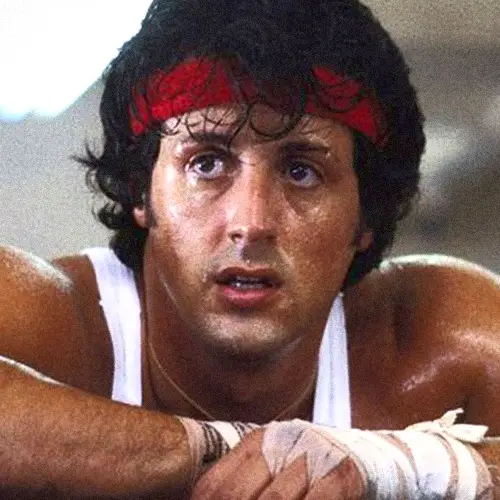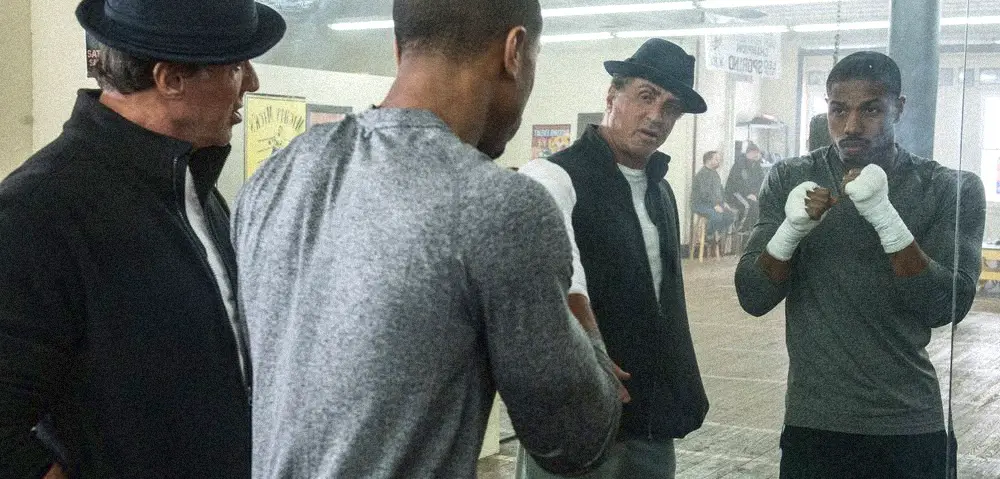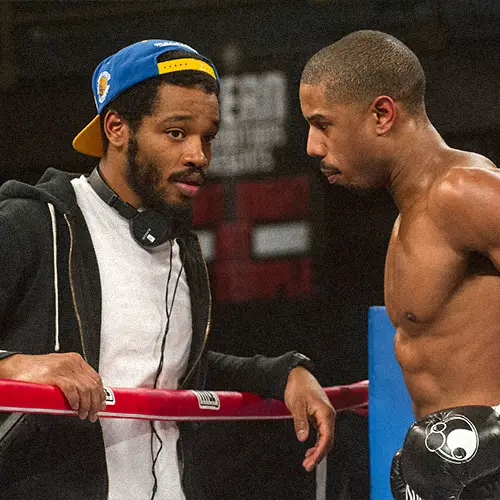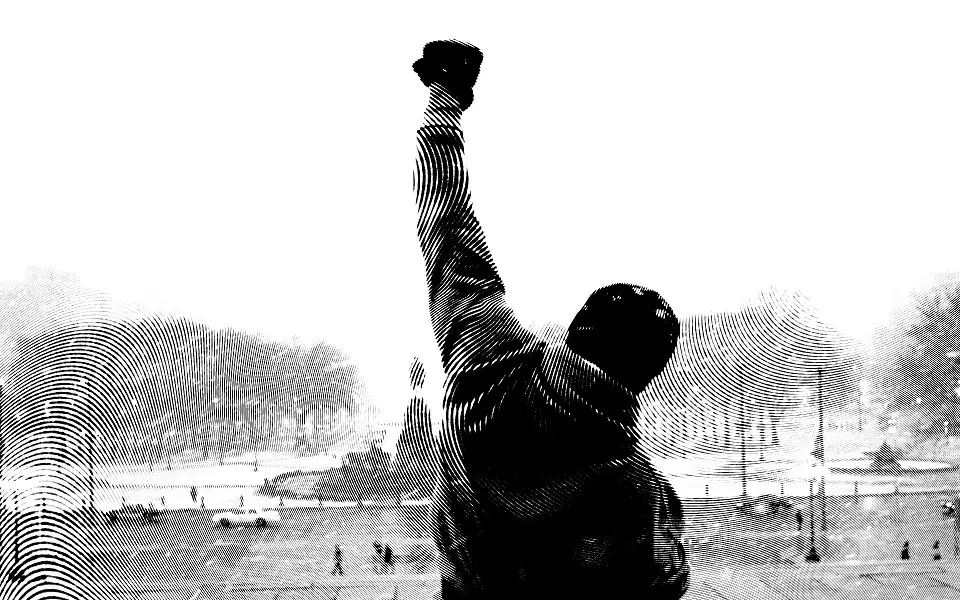[dropcap size=big]W[/dropcap]ith the release of Creed II, the Rocky series will span a grand total of eight films. That in itself is quite an accomplishment, placing it in the neighborhood of long-running franchises like Planet of the Apes, Batman, and National Lampoon.

What makes the Balboa saga even more impressive is the fact that it has—for the most part—maintained a consistency of quality or at least watchability that few series have managed to uphold. There are notable exceptions (I’m looking at you Rocky V), but for the most part even when Rocky danced into the corner of campy melodrama (now I’m looking at you Rocky IV), it kept on its feet.
How has the franchise managed to remain a contender for more than 40 years? Because it’s got guts.
Passion Project to the Extreme
Unlike the majority of mega-hits, the story of Rocky wasn’t cobbled together by a committee. It started out as the passion project of one person—Sylvester Stallone.
The tale of how Sly got Rocky off the ground is a legend in its own right. When he wrote the screenplay, Stallone was a struggling actor whose career was in such dire straits he had to sell his dog to put food on the table. He ended up turning down a big-money deal for the script, because it would have meant casting another actor in the lead role. Instead he took a pay-cut, secured the title part, and gambled that the movie would be a hit. Suffice to say that he ended up earning enough to buy back his dog.
After that, Stallone starred in, wrote, and directed every Rocky-titled sequel (except the ill-fated Rocky V, which he did not direct), allowing it to maintain a consistent purity of vision that you don’t see when a franchise is handed over to studio control.
Emphasis on Epic Storytelling
Every Rocky film aspires to tell a story of epic proportions. At its best, it keeps itself grounded with the working-class, rag to riches tale that started it all. At its most grandiose, it has Rocky solving the Cold War. But no matter what the case, Rocky pulls no punches when it comes to telling big stories that are tightly woven from film to film.
The Rocky saga features a roster of characters that seem like a true family. They’re the Corleones of boxing, if you will. The feud and friendship of Rocky and Apollo, the romance of Rocky and Adrian, the corner support of Paulie, Mickey, and Duke, the eventual passing of the baton to Apollo’s son Adonis, and even the nemesis of Ivan Drago (in a late-night, cable television sort of way)—these are relationships that feel genuine and developed from story to story. They pose and overcome challenges ranging from the emotional to the physical to the social.
The Rocky saga features a roster of characters that seem like a true family. They’re the Corleones of boxing, if you will.
And now with Creed II, we’re seeing the reintroduction of Drago and his son, adding further depth to the generational aspects of the epic.
Speaking of all these names, much of the franchise’s power comes from the fact that it took the time to flesh out characters who we can love—especially its central hero.
We don’t see some big, tough fighter. We’re introduced gradually to a lonesome loser who likes dogs.
Think of the first film, for example. During the first half of its two-hour runtime, nothing much really happens. We watch Rocky as he feeds his turtles, flirts (badly) with the local pet shop girl, works some odd jobs, and walks around. No kidding, there are entire sequences that are just Rocky taking lonely walks, bouncing a racquetball while sad music plays. We don’t see some big, tough fighter. We’re introduced gradually to a lonesome loser who likes dogs.
Most movies would have hurried things along and gotten us to the central challenge—preparing for the world heavyweight championship—as fast as possible. But instead, we’re given a chance to get to know a character we can really appreciate.

A Semi-Reboot Done Right
After the failure that was Rocky V, the series took a 16-year hiatus. It wasn’t resurrected again until Stallone gave us Rocky Balboa, a surprisingly solid installment which seemed to signal the end of the series.
Then came Creed.
Before we dive into Creed, let’s take a look at a speech delivered by our hero in Rocky Balboa:
The world ain’t all sunshine and rainbows. It’s a very mean and nasty place, and I don’t care how tough you are, it will beat you to your knees and keep you there permanently if you let it. You, me, or nobody is gonna hit as hard as life. But it ain’t about how hard you hit, it’s about how hard you can get hit and keep moving forward.
I think Stallone wrote this speech in direct reference to the failure that he met with Rocky V. It was likely, in fact, a response to a string of bad movies he did leading up to the sixth addition to the series. Rocky Balboa came out in 2006, nearly ten years after he’d starred in anything really successful, let alone anything good. Reviewers had ceased to be nice with the sliding-superstar who had brought them Rocky and Rambo. And then he came out swinging with a Rocky return to form.
The Rocky saga was back on its feet and moving forward.
A decade later, we’re given Creed. In the hands of Ryan Coogler—who wrote and directed—we have another film charged with creative passion; another epic that gave us characters we can love.
Ryan Coogler has directed exactly three movies—Fruitvale Station, Creed, and Black Panther. Anyone who knows anything about those movies knows that Coogler gives everything he has to craft a powerful story.

Fruitvale wasn’t just the telling of yet-another police shooting. It had the intelligence and guts to portray something more nuanced than that. Panther wasn’t yet another Marvel vehicle—it was the most complex story in the franchise and became representative of wider social issues.
Coogler had the talent and vision to give us more than we had any right to expect seven movies down the line…
Similarly, Creed delivered more than we’ve come to expect from the typical sequel, reboot, or spin-off (the argument could be made that it’s all three). Coogler wrote Michael B. Jordan a part that is all-too-rare in cinema: a young, black man representing healthy masculinity. He’s just as intelligent and emotional as he is ambitious and athletic. Similarly to how the original Rocky portrayed a character who offered an equal dose of gentle affection to go with his strength and bravery, Creed gave us a hero we could root for in and out of the ring.
In other words, Coogler had the talent and vision to give us more than we had any right to expect seven movies down the line of a boxing franchise. Creed accomplished what Rocky had 40 years before it: it took a story that could have been about nothing more than two buff guys slugging each other and instilled it with heart and impact—emotional impact rather than blows.
Creed wasn’t exactly a reboot, but it certainly took us to a different place in the Rocky universe and gave its themes of perseverance, family, and the importance of love a new voice. Coogler picked up where Stallone had left off and proved that the Rocky saga still has a few more rounds to go.
Creed II is directed Steven Caple Jr., and it marks his first major film—yet another story of an unknown getting his shot at the big time. Will he go the distance and keep the franchise on its feet?
If there is one similarity between movie franchises and a boxing match, it’s that the more time spent in the ring, the more likelihood there is of being knocked down. Let’s hope that Caple Jr. has the skill to keep the series moving forward.
Creed II is directed Steven Caple Jr., and it marks his first major film—yet another story of an unknown getting his shot at the big time.




